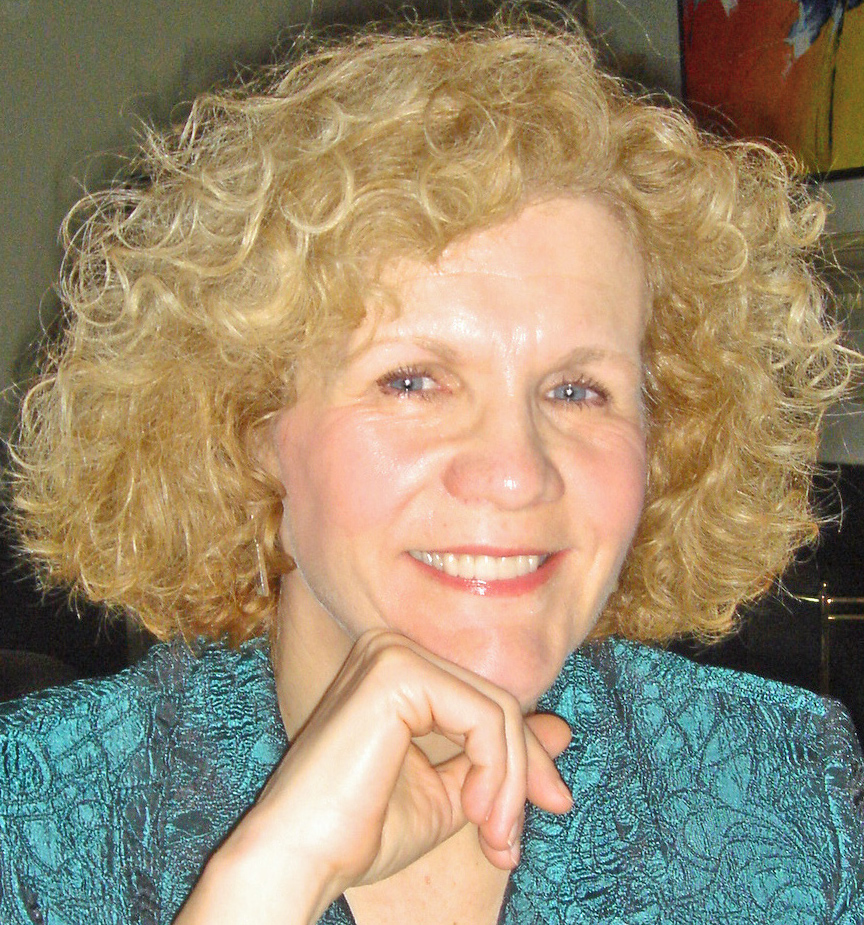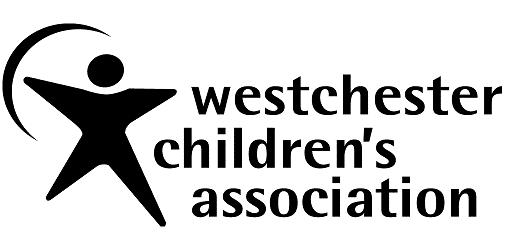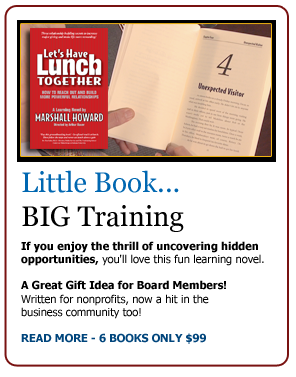Conversation About Our Book Leads to a Job
Here's the background:
The biggest lesson I took away from Let's Have Lunch Together was the importance of focusing my thinking on relationships instead of money. My story is about a relationship I've been able to establish and grow with a special group of our donors.
I started a new job as Development Officer last April with Westchester Children's Association, the oldest child advocacy organization in the United States. A few months before getting the job, I had read Let's Have Lunch Together, which turned out to be very useful in my job interview. As I walked into the Executive Director's office, I immediately saw the book on her conference table. It had recently been given to her by a WCA board member, and she had just finished reading it. Our interview got off to a great start with a discussion of the book, the importance of relationships, and the relationships already in place at WCA. I was so glad I had read it, especially when I got the job.
In getting acquainted with WCA's mission, goals, accomplishments, history, and donor lists, I discovered that for decades, WCA has been selling an engagement calendar to raise funds. No one's quite sure when it started. At one time, it had been a significant fundraiser for the organization, but in recent years, with the advent of the computer, sales of the hard-copy calendar significantly dwindled, and WCA has looked to other sources for income. The format of the calendar is unique and well-loved by those who have bought it for many years, though, so WCA wouldn't consider ending the publication (unless, of course, printing/mailing costs actually exceed revenue). It is currently a very small part of the fundraising picture at WCA.
Although a number of the people who buy the calendar contribute in other ways to the organization, many simply buy the calendar and contribute in no other way. In fact, only 58% actually live in Westchester County. As you can probably guess, the estimated average age of those buying the calendars is 75 -- 80.
I realized that we had relationships in place but not developed with all of the people I came to call our "Calendar Crowd." The August 31st page precedes the order form for the next calendar, so I wrote a letter on August 1st introducing myself to the Calendar Crowd. I invited them to share the history of their connection with WCA. I asked how they originally got involved and why they stay involved. I suggested they could call, email, write a letter or even just a note on the back of the order form.
If I could repeat the many heart-warming stories I received, it would make a book, not an essay. I heard back from almost 25% of the Calendar Crowd, including quite a few stories from people who had been using the calendar every single year since the mid-1930s. The relationships I started are in different stages of development, but in some cases, I've been invited to visit, and in others, we've established regular contact. Sadly, some of the contact I had was from family members informing me of their relative's death. In other words, the Calendar Crowd is a declining population.
It's now February 2008, and the results are in. Despite the declining number of Calendar Crowd members and the declining number of orders for calendars, donations accompanying the remaining calendar orders have increased dramatically, as has the Calendar Crowd response to our end-of-year appeal.
I continue to have regular contact with a significant portion of those who responded, and several of them have been very supportive and encouraging to me in my new job. In the near future, I plan to ask for their help as I start a Planned Giving program at WCA. Of course, bequest discussions must be handled carefully, but I'm convinced I will have help and support from the Calendar Crowd as I go forward. Those relationships are in place and growing. Like the book suggests, I chased the relationships instead of asking for money, and it's paid off.

Betsy Steward
Westchester Children's Association - Westchester, NY

About Westchester Children's Association
Westchester Children's Association works to ensure that all children in Westchester County are healthy, safe, and prepared for life's challenges. WCA, the oldest child advocacy organization in the US, starts its advocacy from the premise that all young people need the same things: health care, adequate housing, appropriate education, and safe, nurturing families. There are many children living in Westchester who don't have these basic building blocks, and who need the larger community to make sure their needs are addressed. Since 1914, WCA has achieved important victories for children by educating the public and policy makers about children's needs, and mobilizing those who care about children to push for effective approaches to meet those needs.

Relationship Strategies That
Build Your Capacity
Everyone talks about the importance of relationships in capacity building.
Our products focus solely on showing development professionals and their boards, step-by-step, how to grow their mission by making relationships stronger and more genuine.









